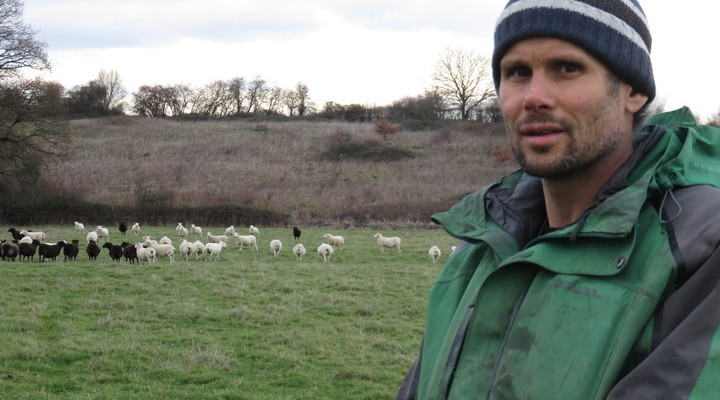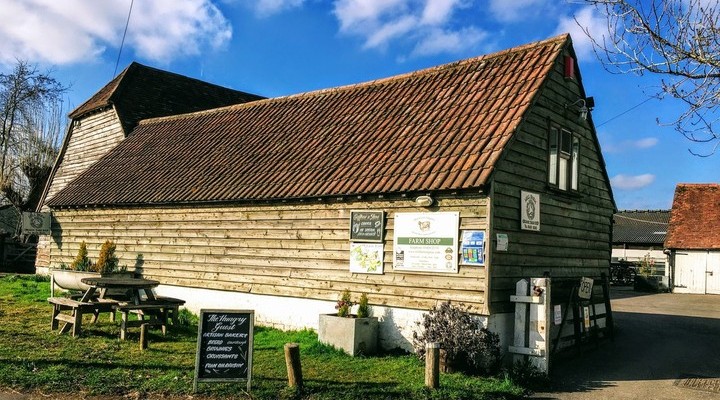Pasture for Life – Case Study – Mill Farm
 Nick and Jenny Shaylor run a thriving mixed farm and farm shop where the emphasis is on organic and grass-fed lamb and beef.
Nick and Jenny Shaylor run a thriving mixed farm and farm shop where the emphasis is on organic and grass-fed lamb and beef.
Nick Shaylor has been the tenant at Mill Farm, Isington in North Hampshire since 1998. The farm is owned by Mr. and Mrs Mayhew and Nick has managed it organically for more than 17 years.
Extending to 230 hectares, the farm is characterised by gentle hills interspersed with pockets of ancient woodland, connected by many miles of old and recently established hedgerows. A chalk stream called the River Wey dissects the fields and there are traditional water meadows. There is a strong environmental focus, currently supported by an OELS/HLS land management agreement.
The farm is cropped with a diverse mixture of permanent pastures, red clover, white clover and herb-rich leys and grasses sown in rotation with organic spring wheat and milling oats.
“Our aim is to produce and sell meat of exceptional quality from a pasture-based organic farming system,” Nick explains. “We have had an on-site farm shop for 12 years, managed by Barbara Ferencz and sell at 60 Farmers’ Markets each year, including Winchester, Petersfield and Farnham. We also sell to local pubs and restaurants. All the meat is fully traceable back to the animal that lived on the farm, and we do get terrific feedback from our customers.”

Two breeds: one flock
There is a flock of 400 Black Welsh Mountain and Wiltshire Horn/Easycare sheep and a herd of 90 South Devon and Aberdeen Angus suckler cows. The lamb is certified 100% grass-fed and carries the Pasture for Life rosette when it is sold. The aim is for the beef cattle to become Pasture for Life certified in the near future.
The ewes lamb from the 15 April outdoors, benefiting from the early spring grass growth in late pregnancy. This high quality feed supply is what makes the whole sheep system work.
Management is kept as simple as possible and the breeds of sheep helps. They have strong, reliable feet so there are no footrot problems, and there is no need to shear the white sheep. The lambs fatten well off just grass, with some being held back to market as hogget or mutton.
“We draw lambs from 12 weeks of age and take a batch down to the abattoir in Devizes once every two weeks,’ says Nick. “The average carcase weight is 13kg and we sell 250 through the shop each year.”
The ewes always lamb in the same paddocks and are visited twice a day to check if any are having trouble giving birth – but this is rare. Nick aims to make as few interventions to the ewes as possible, which is better for Nick and the sheep.
Faecal egg count testing is done six weeks after lambing to check worm burden. Being organic, the sheep are never treated with anthelmintics prophylactically.
The lambs are all EID tagged and their performance monitored throughout their lifetime.
Mixture of grazing
Spring wheat is grown to feed the three Saddleback and Tamworth sows and 40 fat pigs, whose meat is sold through the farm shop. This crop is undersown with either a red clover or white clover ley – which is ready for the lambs to graze in the second half of the year once the cereal has been harvested.
Three-year red clover leys, incorporating resilient festulolium and Italian ryegrass varieties, are grown on more remote ground that will be cut for silage.
On other fields white clover leys rotate with the arable crops. More recently, Nick has introduced herbal leys with plantain and chicory. Silage or hay is made from a selection of leys, depending on grass growth and the weather at the time of cutting. Contractors are used to make conserved winter forage and all of the arable work.
Joining the PFLA
Nick came across the PFLA four years ago and has since attended events and workshops.
“We have always been very keen to adapt our management to get the most out of our grassland,” says Nick. “ We want a system that is productive yet environmentally sensitive. The PFLA sits very well with all this, and we have had enquiries for our lamb come through the PFLA website.
“The Pasture for Life rosette mark is a great asset to have – it is a guarantee that the meat comes from animals that have been 100% grass-fed and have never eaten grains.
“We want to supply local consumers and prioritise selling locally rather than posting it around the country via mail order.
“We are involved with the community. My wife Jenny hosts school visits and open days and we raise money for the local school and football club where our three sons play. People are increasingly keen to learn more about where and how their food is produced and we are tapping into that.”



